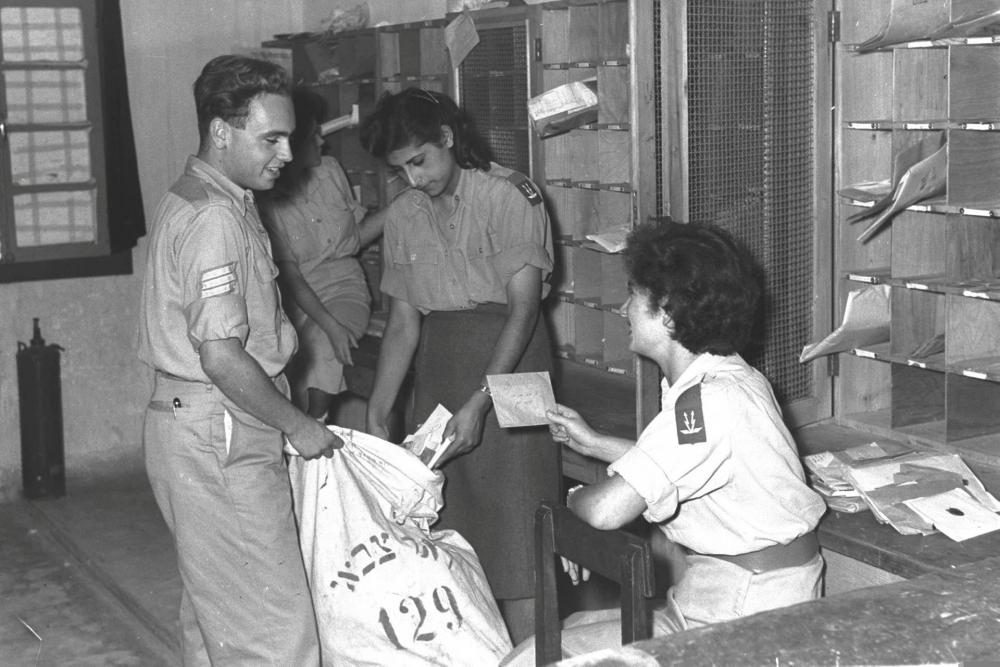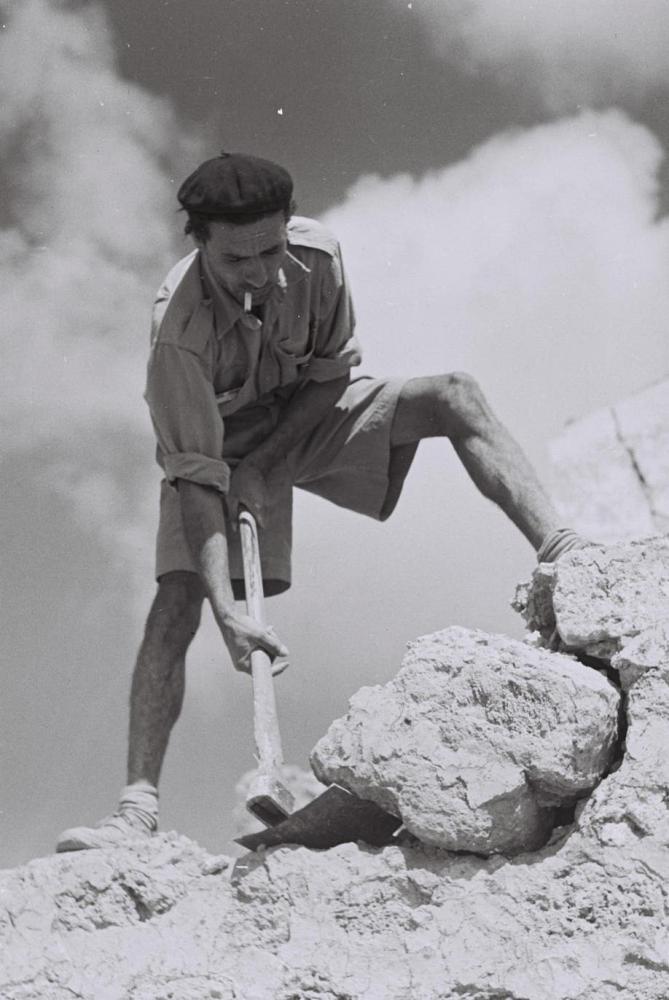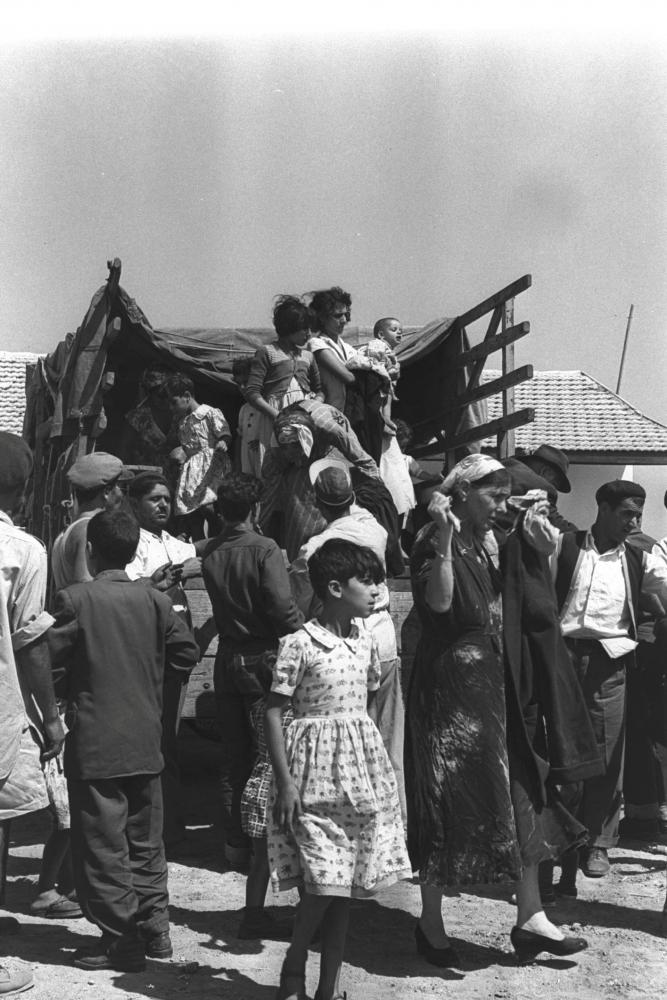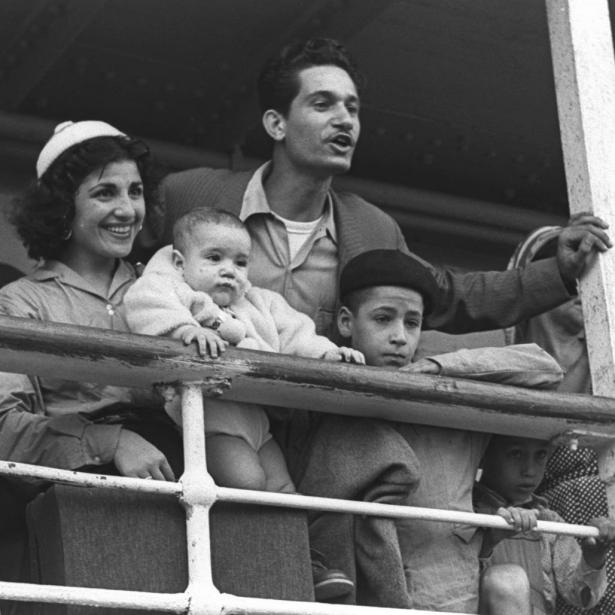'We Saw Jews With Hearts Like Germans': Moroccan Immigrants in Israel Warned Families Not to Follow
In 1949, in the midst of the War of Independence, an Israel Defense Forces soldier wrote a letter to his family who remained in Morocco. “We came to Israel and thought we’d find a paradise here, but regrettably it was the opposite: We saw Jews with hearts like Germans.” He also had a word of caution for his relatives: “If you want my advice, stay in North Africa; it’s better than the Land of Israel.”
The soldier’s identity remains unknown, but thousands of similar letters that were deposited in the IDF and Defense Establishment Archive show that he was not the only Moroccan immigrant who harbored such feelings. Excerpts from the letters, which had remained below the radar of historians and researchers, are now being published for the first time.
Another soldier from North Africa was more direct and blunt, accusing the Ashkenazi Jews of racism. “The European Jews, who suffered tremendously from Nazism, see themselves as a superior race and the Sephardi Jews as belonging to an inferior one,” he wrote to his parents. He complained that the North African new immigrant “who came here from afar and was not required to leave his home because of racial discrimination – is now humiliated at every turn.”
A feeling of injustice also arises from the lines that follow: “Instead of gratitude, they treat us like savages or something that is unwelcome. When I see African friends wandering the streets, one without an arm, the other without a leg, people who spilled their blood in war, I ask myself, ‘Is it worth it?’”
Historian Shay Hazkani – whose research focuses generally on the Israeli-Palestinian conflict and on how Jewish immigrants from North Africa and the Middle East were absorbed and treated during the early years of the state – discovered these letters in classified reports written by the postal censorship bureau that operated in the army from its inception. The unit’s members read the letters sent by soldiers and deleted classified information. Moreover, they also copied – without the soldiers’ knowledge or consent – passages that would interest the army and the civilian authorities. By this means it was possible to monitor the mood among the soldiers and to track other developments.
Dr. Hazkani was especially interested in what these historical sources could reveal – despite the problematic nature of reading personal correspondence – about the feelings of immigrants who had come from Morocco to fight in the war in 1947-48, who were opening their hearts to their families who remained behind.
“The Poles control everything,” one soldier wrote his family in Morocco at the time, noting that “95 percent of the guys here are dissatisfied, and would like only to go back to where they came from.” In the view of another soldier, “Palestine might be good for people who suffered in the camps in Germany, but not for us, the French, who are lovers of freedom.” (He was referring to France’s protectorate regime, which ruled in Morocco until the country became independent, in 1956.)
- Dozens of Zionist pioneers committed suicide when their dreams shattered in Palestine. This is one of them
- How the Israeli army's racist system harmed hundreds of thousands of Mizrahim
Allegations of discrimination at the hands of Ashkenazi immigrants are rife in many of the letters Hazkani studied. One soldier, originally from Casablanca, wrote his family back home that the Polish Jews “think Moroccans are savages and thieves. When we pass by, they look at us like [we are] brutes.” His dream was to return to Casablanca, he told his family, and he would go on crying until he was able to buy a plane ticket.

“I can’t stand this country, which is worse than jail. The Ashkenazim exploit us in everything and give the best and easiest jobs to the Poles,” a soldier wrote to relatives in Morocco. “The wages are worth nothing. For his easy labor, the Pole gets 2.5 liras, but the maximum we Moroccans can earn for our arduous and strenuous work is only 1.5 liras.”
The perusal of thousands of letters by new-immigrant soldiers from Morocco suggests that the majority of them wanted to return home and that they recommended that their families not immigrate to the Jewish state, or at least put off any such move. The percentages shift between periods and between the groups of letters sampled, but a summary drawn by the IDF turns up high numbers: About 70 percent who wanted to go back to Morocco and 76 percent who recommended to their families to stay put.
The army’s top brass itself generally displayed a patronizing, hostile and distant attitude toward soldiers of North African origin, according to the IDF’s own files, from which the letters quoted by Hazkani were taken. “Even though the soldiers are of inferior education and culture, they manifest potent criticism,” one army report states. “North African immigrants suffer from an inferiority complex that might be caused by the way their Ashkenazi colleagues treat them,” a censorship official wrote after analyzing the soldiers’ letters.
“This phenomenon is serious and raises concern,” he continues, not just because of the damage to morale among the soldiers, “but also because of the information sent by the ‘offended’” to their families and friends in their countries of origin.
Data from the Central Bureau of Statistics shows that 6 percent of those who immigrated from Morocco in the years 1949 to 1953 actually returned to their native land: 2,466 out of approximately 40,000. Proportionally, Hazkani found, this was almost twice the number of those who returned among the immigrants from Europe and America (Ashkenazim).
‘Human sheep’
Complaints about Israel did not only make people decide to leave the country. There was an Israeli government policy that was intended to hinder or delay immigration. In 1951, the government adopted a policy of “selective aliyah.” In a 1999 article, “The Origin of Selective Aliyah,” Dr. Avi Picard, from Bar-Ilan University’s Land of Israel Studies department, notes that the restrictions referred to the "quality" of the immigrants – who by and large came from North Africa at the time – and not their numbers, and were imposed via classification on the basis of one's physical fitness, age and profession.
“Don’t believe the Zionist Office in Morocco. It is spreading propaganda, lies and distortions,” an immigrant soldier from North Africa wrote his family in an effort to dissuade them from making the move to the Holy Land. “Here you’ll be called ‘dirty Moroccans,’ and the papers will write that the Moroccans don’t know how to dress or how to eat with a fork. Only with their hands. They think that the only human beings here are the Poles.”

The unnamed soldier was referring to a series of articles published in Haaretz in 1949, which continue to resonate to this day. A reporter on the paper, Aryeh Gelblum, assumed a fictitious identity in order to document life in the immigrants’ transit camps. He published his grim conclusions under the headline, “I was a new immigrant for a month.”
“This is an immigration of race such as we have never before known in Israel,” he wrote, in reference to the North African immigrants. “We have here a people at a peak of primitiveness. The level of their education borders on absolute ignorance, and even graver is incompetence at absorbing anything intellectual.”
Gelblum added, “Only slightly do they surpass the general level of the Arab, Negro and Berber inhabitants from their places [of origin]… They are completely subject to primitive and savage instincts. In any event, this is an even lower level than what we knew among the Arabs of the Land of Israel of the past.” He continued: “What can we do with them? How can we absorb them? Have we considered what will happen to this country if they became its citizens? One day the rest of the Jews from the Arab world will immigrate! What will the State of Israel look like and what sort of level will it have if it has citizens like these?”
In the summer of 1950, Davar, the organ of the Histadrut labor federation, ran an article about a transit camp in Marseille where new immigrants, most of them Jews from North Africa, were waiting on their way to Israel. Terms such as “bad material” and “human sheep” were used to describe the prospective immigrants, who would have to be “kneaded” in order “to shape them.” The article went on: “Will it be possible to form new traits among these abject human beings? In Israel, will they not again descend into the atmosphere from which they were removed – among their brethren in the community?”
An article in Davar that September warned about the “oriental” character of the people who would flood Israel. “Our fate depends on quality. In other words, the degree to which the non-oriental elements, which are the only ones that can sustain this country, will triumph. How to elevate them to the Western level of the existing community and how to protect ourselves with all our might against the possibility that the quality of the populations of Israel will fall to the oriental level.”
Similarly harsh comments were made by the country’s leaders, as has already been revealed. Levi Eshkol, the finance minister and later prime minister, was quoted in 1953 as saying, “We are shackled with human refuse, because in those countries they are sweeping the streets and sending us in the first row these backward people.” Other leaders expressed themselves in similar terms.
Some of the immigrants from Morocco heard these voices and read the articles and were enraged. Their feelings were given expression in an article titled, “Moroccan Jewry Gazing toward Israel,” published in 1949 in a Jerusalem-based periodical, Hed Hamizrah (Echo from the East). It opens by noting that at first “the enthusiasm of the masses of Jews [in Morocco] for making aliyah to the Holy Land was unbounded.” Subsequently, however, when the newcomers encountered Israeli reality, “that enthusiasm began to be mixed with bitter disappointment.”
It is clear from this that the letters from the disappointed soldiers reached their destination in Morocco and resonated there. “The reports reaching here from Israel are ominous. We are told that the immigrants are being received in Israel with gross discrimination and scathing insults,” the Hed Hamizrah writer noted. “The sorrow is heightened when you hear that these insults are not coming from gentiles but from their brothers who are in Zion, on whom they pinned all their hopes and from whom they thought to find succor and aid until they adjusted to life in Israel.”

The author wonders “what did we do to deserve having this trouble fall upon us, and this shameful attitude?” He goes on to review the contribution of Moroccan immigrants to Israel’s rebirth: “Is this the reward that the official institutions pay us for having fulfilled our national duty in all senses? After all, you all know what we have wrought in the past and in the present. We were among the first illegal immigrants to Israel. Young sailors among us left their families and suffered together with their brethren in the concentration camps of Cyprus. Young lads from Morocco were also not lacking on [the ship] Exodus Europe 1947. Our boys fought like lions on all the fronts, in the north and the south, the Galilee and the Negev, in the Old City of Jerusalem and in the land’s other cities, and blood was shed everywhere.”
The article concludes: “Morocco’s Jews fought for the deliverance of their land, and why should they be discriminated against? Why is their blood different from the blood of their Western brothers? The bitterness caused by this insulting attitude is growing apace here. Everyone is demanding that the government of Israel right this wrong.” Addressing members of Knesset, the writer calls for “the abolition of this racial discrimination, for we are the children of one father.”
Yaron Tsur, an expert in the history of Jews from the Arab and Islamic countries, addresses this issue in his 2001 book “A Torn Community: The Jews of Morocco and Nationalism 1943-1954” (Hebrew).
“The first testimonies about the cooling of the enthusiasm for the idea of aliyah to Israel are connected to the reports about the shock experienced by the immigrants from Morocco at what they viewed as discrimination against Sephardim overall and against Moroccans in particular in Israel,” Prof. Tsur writes. “That was one aspect of their encounter with the ethnic problem. The potency of the negative impact these reports created may be gleaned from numerous testimonies. This discrimination was apparently the phenomenon that was most damaging to Israel’s image in the eyes of the diaspora.”
According to Tsur, heightened efforts to portray the positive aspects of immigration to Israel were of no avail. “No propaganda could offset the impressions of the immigrants in letters from Israel and the testimony of those who returned,” he notes. Complaints about discrimination were heard from every quarter in Morocco, he writes, and they also had an impact on the efforts to raise funds from Moroccan Jewry for the Zionist cause.
Thus, the professor describes a meeting in a private home in Rabat, at the end of which one of the participants said to the guest speaker, “You spoke well, but I will not donate anything and I will try to see to it that others follow my example, because you are treating Morocco’s Jews like savages.” In another meeting, held by an MK from the Sephardi List, Avraham Elmalich, with Moroccan rabbis in the city of Port Lyautey (today, Kenitra), a religious court judge requested of him “that every son of Israel who will go up to Israel, whoever he may be, it will not be said of him, ‘This is an African, a Sephardi or an Ashkenazi,’ but just a plain Israeli.”
The soldiers’ letters also reflected this sentiment. One soldier wrote his family that the antisemitism in Israel was worse than in Poland. Indeed, he added, the discrimination was so widespread that it could be compared to the extreme nature of relations between whites and Blacks in America. Striking a similar note, another wrote, “Orientals are treated here like Negroes in the South of the U.S. There is great hatred between the Orientals and the Westerners, who make up the Government.”
One soldier wrote, dishearteningly, that despite everything, he preferred to remain in Israel and not return to Morocco. It is better to be a “filthy Moroccan” than a “filthy Jew,” he explained to his family.
Waxing poetic, another expressed the hope “to finish my service in the IDF and return to you, to my homeland Morocco, which I loved. This makes me very happy.” One of his comrades-in-arms, who was from France, was frustrated at being identified, mistakenly, as a Moroccan. “I only know French but my skin is tan and I resemble a North African. What should I do? No one believes I am not North African. I don’t have a job, and even ‘white’ girls don’t want to dance with me,” he complains. Another soldier cautioned his family that this was not the right time to immigrate to Israel. He explained, “You must know that the Arabs are our brothers, unlike the Ashkenazi Jews, who make our lives miserable. For all the money in the world I will not stay here.”

‘Big Brother apparatus’
An analysis of the letters reveals that the writers effectively refuted the central tenets of Zionist propaganda: The “homeland” is not Israel but Morocco, and it is only to there that can one “return.” As for the Jewish state, the only recourse is to flee it. Moreover, the brethren of Morocco’s Jews are not the Jews of Poland or Germany, as those who espoused the “ingathering of the exiles” had hoped, but rather the Arabs. Thus, instead of a new – Israeli – identity, the hard landing experienced by some of Morocco’s Jews contributed to the shaping of a Moroccan identity.
The soldiers’ letters are quoted in Hazkani’s new book, “Dear Palestine: A Social History of the 1948 War” (in English, from Stanford University Press). The historian has drawn in the past on the same collection of letters from the army’s postal censorship unit. One such study, which gave rise to an article in Haaretz in 2013, dealt with letters sent by soldiers from the front in the 1973 Yom Kippur War. The letters themselves, in the army archive, are not accessible to scholars or others. Selected passages from them were quoted in internal military reports under the heading, “The Soldier’s Opinion,” earmarked for senior ranks – and it is these reports that Hazkani was able to locate.
How did he get to this archival collection in the first place? At the beginning of the 2000s, Hazkani was the military correspondent for Channel 10 News. One day, while preparing an item about Israel’s arms deal with Germany in 1958, he came across an odd document. “It summarized the views of ‘ordinary’ soldiers about the deal… Their views were extracted from their personal letters, secretly copied by a massive Big Brother apparatus,” Hazkani explains in his book.
Although the historian's current focus is on soldiers of Moroccan origin, other archival documents show that they were not the only foreign-born soldiers during the state's first decade who had scathing criticism about the Israeli society in which they found themselves. Soldiers from the United States, Great Britain and elsewhere who arrived as part of the Mahal project – involving army volunteers from overseas who were not immigrants – also weren’t wild about the so-called sabras. A survey conducted among the volunteers in 1949 by the Israel Institute of Applied Social Research (later renamed the Guttman Institute, and today called the Viterbi Family Center for Public Opinion and Policy Research) found that most of the newcomers expressed negative opinions about the Jewish state and its inhabitants (55 percent), with the bulk of the complaints referring to the phenomenon of proteksya (cronyism or favoritism). “Other reasons for resentment,” Hazkani notes, “were chutzpah, egoism, hypocrisy and lack of respect.”
In this country, “it’s not what you know but who you know” that’s important, one of the volunteers noted in his answers to the questionnaire. “Proteksya… proteksya… what chance does a guy like me have without that vitamin?” added another. Some complained that the locals made no effort to be friendly, and were impolite, impudent and loud. A common theme was that Israelis think they’re always right and can’t abide the idea that sometimes the other side is right. The volunteers also felt that the locals attached too much importance to their country of origin, which affected their attitude. And, of course, that Israelis love aliyah but not olim.
The army’s postal censors diligently copied passages in which the volunteers expressed highly negative views about their experience in Israel. “It is enough if I say that when the Anglo-Saxons came here, 95 percent were interested in settling. Today, you can’t even find 5 percent,” a soldier wrote to his family in England. “In this country, soldiers try not to die for their country, but try, and with success, to have others (foreigners) die for their country,” another observed. A volunteer soldier from the United States castigated the sabras’ “reprehensible behavior” and termed them “irresponsible” and “cheaters.” “When I come back home,” he added, “I’ll tell you how the people here falsify all the ideals that you work so hard for and that for the sake of their realization I came here.”
A South African soldier expressed antiwar sentiments, writing to his family that he didn’t want to fight for imperialism and the Zionists’ “territorial ambitions.”
Another maintained that “a golem is being created here, and no one knows how it turn out when it grows up.” The golem in question was the State of Israel itself, which arose, he wrote, thanks to lofty ideals but was losing control over its character and its future.


Spread the word